In an age of ‘winning’ transfer windows and the demand for perfection, the art of enjoying football is being lost. But it doesn’t have to be, writes Jeff Goulding.
One of Jurgen Klopp‘s most heralded achievements was the seemingly impossible task of “turning doubters into believers.”
After assembling arguably the greatest squad in the history of the club, not to mention winning almost every trophy on offer to him, amazingly, he may have to now repeat the feat. Is he just a victim of his own success, or have many of us lost the art of enjoying football?
Remember that moment, when a grinning Klopp turned to the camera, dropped the smile, and with all the seriousness of a party political broadcast in which a would-be Prime Minister is about to deliver the killer soundbite, stared straight down the barrel of the lens and said, “you must change from doubters to believers, now!”
For me, though, there’s an even more significant moment that arrived after a last-gasp goal had secured no more than a solitary point, at home to West Brom.
The German had managed just six wins from his first 13 games as manager, a run that included a 2-1 defeat to Crystal Palace at Anfield, during which the boss had chastised some supporters for leaving early and making him feel “pretty alone.”
A little more than a month later, the Reds would find themselves in a similar predicament, 2-1 down to Tony Pulis’ West Brom.
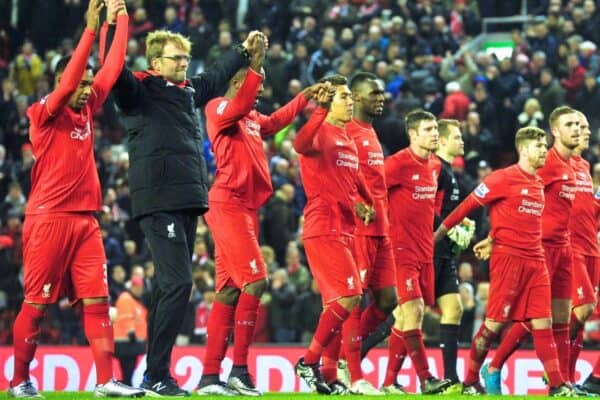
This time, as the game ticked into the 96th minute, the ground remained full. Barely anyone could bring themselves to leave – or perhaps they feared Klopp’s wrath. Whatever their reasons, the resultant atmosphere was like rocket fuel propelling waves of Liverpool attacks.
It’s easy to look back at that result, as many would, and conclude that on the whole, it was fairly meaningless, even disappointing. After all, Liverpool should be beating teams like West Brom at home, right?
If that’s your assessment, then I imagine you’ll be outraged to learn that not only did Klopp see things differently, but he actually led the whole team in an extended celebration in front of the Kop.
Predictably, the move attracted ridicule. However, to those like me who were at the game, it felt perfectly natural. We had spent 90 minutes living in the here and now, unburdened by fears of where the result might lead us, and grateful for the fightback we had witnessed.
Klopp’s celebrations were the act of a man and his followers wrapped up in the emotion of a moment. And I don’t believe Divock Origi scores that equalizer without that collective mindset.
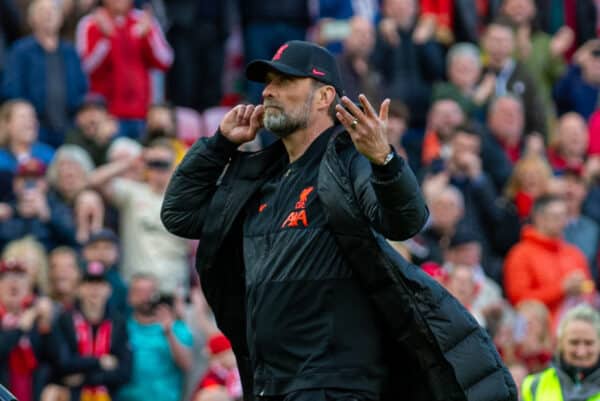
To me, it was a masterstroke. Weeks earlier he had chided those who refused to believe such a moment could arrive. As he and the players took their bows, it feels to me now that he was saying, ‘yes! You heard me, you listened, and look what happened.’
That’s the moment we became believers in my view. After years of living in the past and begging the future to be better, Liverpool fans started revelling in the moments that only football can grant us, and to hell with everyone else.
Have we now exhausted that magic? I do wonder. In the years since, Klopp has brought home almost every piece of silverware possible, including the biggest prizes of all. His only issue now as it was then, is that continued success is dependent on keeping pace with a rival backed by the wealth of a sovereign nation, in a model that requires him to live within his footballing means.
The impossible pursuit of perfection
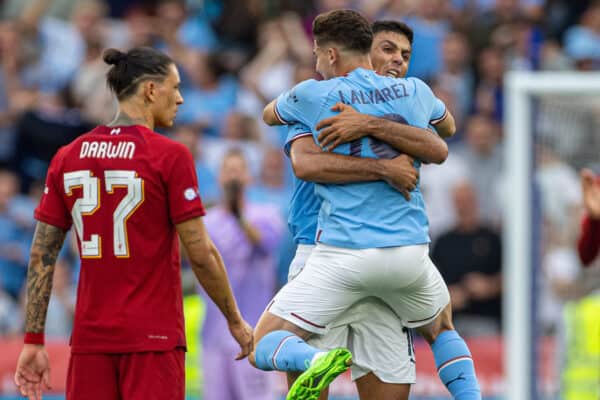
In this context, Klopp has spoken of the need for perfection in order to challenge City, but even he realises that’s an impossible ask.
However, some fans seem to feel it’s their duty to demand the same, throwing toys out of prams when the highly improbable doesn’t materialise. In doing so, they have turned their backs on dreaming, believing and revelling in the results.
I have to ask, do any of these people truly enjoy football? No victory ever seems enough, no signing can come too soon or be too expensive. It matters not whether the manager actually wants a player, only that we “keep up,” that we claim that next marquee signing.
To be fair, this is not an entirely modern phenomenon. There has never been a time when all Liverpool fans were stoical and circumspect in the face of setbacks. Trust me, the Liverpool Echo letters page during the early 1970s had its share of irate fans declaring, “Shankly is finished.” Paisley, Fagan and Dalglish all had their doubters, though they were far fewer and much easier to ignore.
As a kid, I too was capable of ridiculous overreaction to poor results and the club’s transfer dealings. I cried when we lost, locked myself in my room and would refuse to eat. If we drew, it might as well have been a defeat.
Eventually, I developed some perspective, probably sometime after my 30th birthday. I still hate getting beat and don’t like drawing. Only a victory lends my week some calm, at least until the next game when I know I may have to repay it with interest.
But I can rationalise it now. Age comes with many downsides, but perspective isn’t one of them.
The skewed game
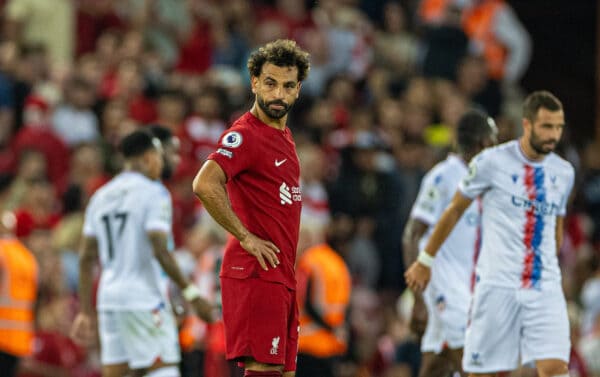
If social media had existed in my youth I’d have graced many a blocked list, and rightly so. So I guess it may just be full of 21st-century equivalents of my childish self, throwing tantrums and their dinners at virtual walls. But having seen grown-ups declaring, after two drawn games in August, that ‘the season is over,’ I feel like locking myself in my room again.
I find the utter hysteria that greets every indifferent display hard to bear. That, and the constant disappointment with the club’s transfer activity, as if buying players is akin to loading a disc on a gaming console – or swapping Panini stickers in the playground, for people of my generation.
To me, the constant and irrational demands for perfection are as unhealthy as they are annoying. City’s spending, and to be fair their results, has skewed the game beyond all reason.
The teams I fell in love with as a child wouldn’t have won a single title if they had been competing in such a financially doped competition.
However, rather than seeing this as a mark of how good Klopp’s Reds are, too many are spiralling into defeatism and negativity. If this sounds like you, then ask yourself, is it really worth it?
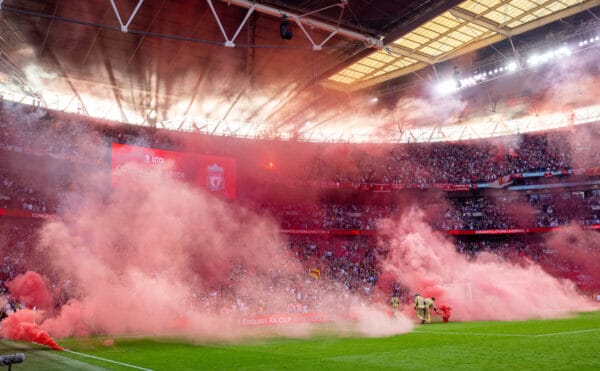
It can’t be healthy to have so completely lost that art of enjoying football. If only perfection can keep you on an even keel, you are doomed to sink into frequent bouts of dejection. Why do that to yourself?
My advice, for what it’s worth, is to reset your mind to those early days of Klopp’s reign. Live in the moments again. Enjoy the ride, and only survey the damage when the season’s over, safe in the knowledge that you’ve been on a great journey regardless.
Trust me, footy’s better that way. Life’s better that way.
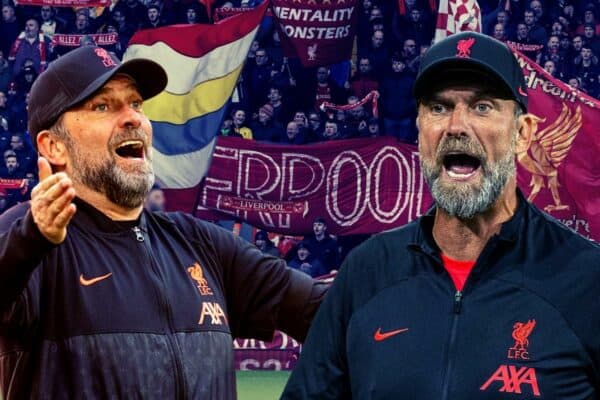












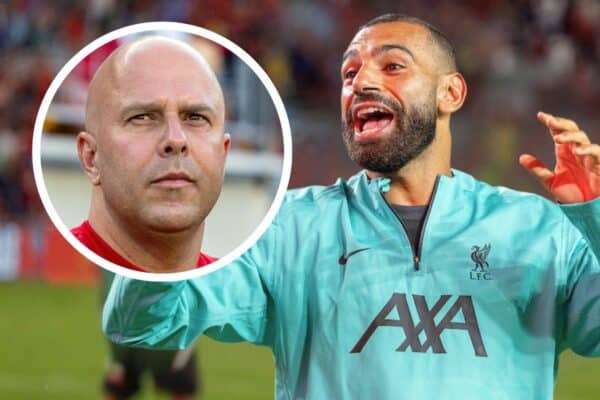




Fan Comments